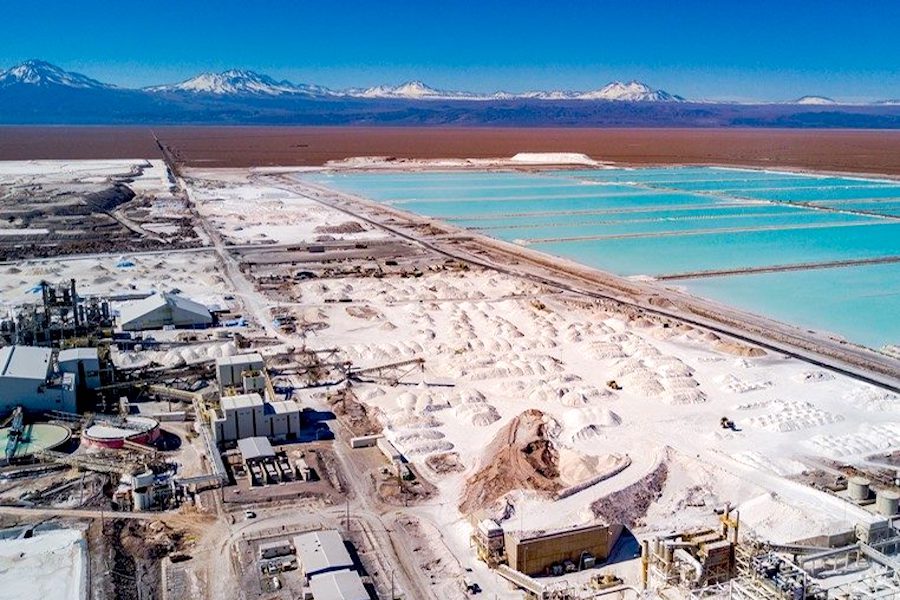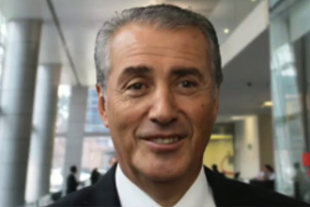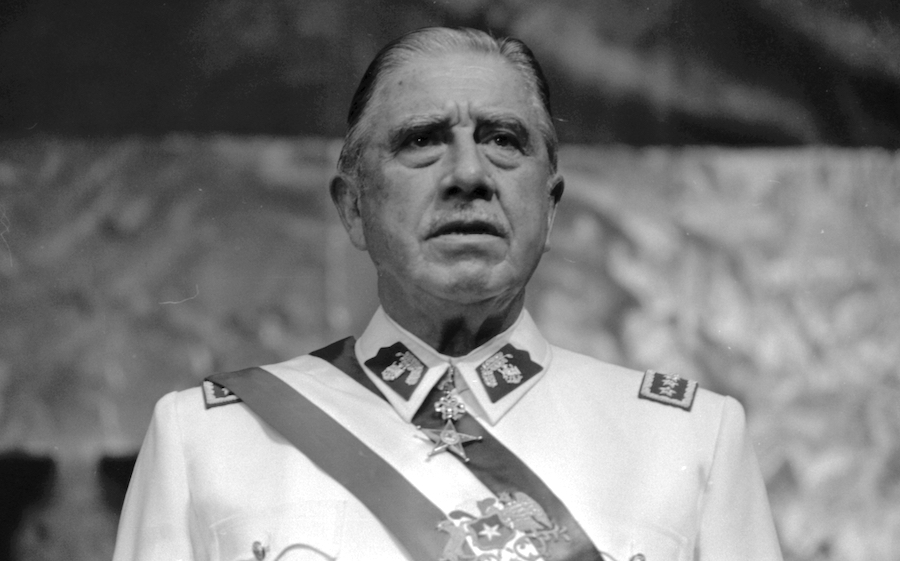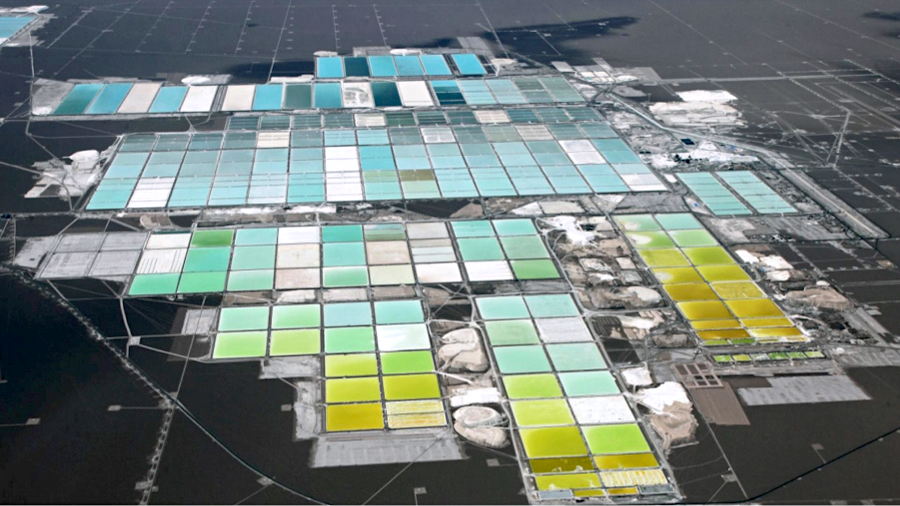CHILE
Lithium king crowned in dictatorship sees $3.5bn fortune at riskBloomberg News | June 24, 2022 |

SQM’s evaporation pools in Chile’s Atacama Desert. (Image courtesy of SQM.)
Few people are better positioned for the electric-vehicle revolution than the billionaire Julio Ponce Lerou.

He retired years ago, but the former son-in-law of late dictator Augusto Pinochet is still known in Chile as the lithium king. And Ponce has never been richer: The shareholder group he leads has seen its approximately 25% stake in SQM, the world’s No. 2 lithium miner, quintuple over the past seven years amid record profit, increasing the value of the portion he owns to $3.5 billion.
Like billionaires across the globe who have seen their wealth soar, from Elon Musk to Chinese property moguls, Ponce, 76, has become a target at home amid the boom times for lithium, a key mineral for making electric vehicle batteries. One of his main adversaries may turn out to be Chile’s 36-year-old president, Gabriel Boric, who supports a constitutional rewrite that may impose environmental curbs on mining and wants to create a national lithium company that could compete with SQM, which sits on the planet’s richest deposit.
Boric’s brand of left-wing politics is much more investor friendly than that of Salvador Allende, whose 1971 nationalization of US-owned mines led to the creation of state copper giant Codelco. But there are signs that the lithium business is about to get increasingly complicated in Chile, with authorities recently rescinding new contracts amid calls for the state to get a bigger share of the mineral windfall.
The shifting landscape for the lithium king has its roots in a wave of street protests in 2019, which led to a rewrite of a constitution born in the Pinochet era that enshrines private property, including minerals and water. Writers of a new charter want to tip the balance back toward community rights, environmental protection and state-run social services, with a greater say for indigenous groups in where and how natural resources including lithium are extracted.

Julio Ponce Lerou. (Screenshot 24 Horas | YouTube.)
Ultimately, the moves could force SQM to adopt extraction techniques that push up costs or limit production, potentially marking an end to booming profits. Ponce — Chile’s second-richest person — is the only disclosed name from the shareholder group, whose entire stake is worth more than $6 billion. Filings show his portion is equivalent to about 16% of SQM. The shares fell 3.2% in Santiago trading Thursday.
The movement is increasing scrutiny of SQM’s business model, which is based on pumping up vast amounts of brine from beneath a salt flat in northern Chile’s Atacama Desert and storing it in giant evaporation ponds for a year or more — a footprint that can be seen from space. The resulting concentrate is turned into lithium carbonate and hydroxide at nearby plants and sent off to Chinese and Korean battery makers.
As simple as it is profitable, the process uses far less fresh water, chemicals and energy than hard-rock mining. But the solar evaporation technique means billions of liters of brine are extracted and then vaporized in one of the most arid places on Earth, which some say is a threat to wildlife such as pink flamingos that inhabit its Mars-like landscape.
Radical proposals such as nationalizing the entire industry have fallen short in the constitutional process. But if the new charter opens the way for the mineral-rich brine under the Atacama to be considered a type of water — an idea the company disputes — that type of mass extraction may come under threat.
There are already calls from some communities and politicians to move to a more selective or direct process of mining that would mean far less evaporation — and probably less output and profit. Both SQM and Albemarle Corp., the only two lithium producers in Chile, are investigating such techniques, which are relatively untested commercially.
Across the developing world, the growth in EVs has created a new demand for minerals from Atacama lithium to nickel in Russia’s Siberia to cobalt in the Democratic Republic of Congo. Powering the world with less fossil fuels presents a new set of social and environmental challenges. In the short term, it’s made mineral moguls like Ponce fabulously wealthy.
But the energy transition is leaving behind the communities where the metals are extracted, says 70-year-old Sara Plaza, an indigenous resident of Peine, a village near the Atacama operations.
“Mining dried out the salt flats,” she said from her modest home, with a view to the chalky expanse and mountaintops that surround her town. “Julio Ponce has done whatever he wanted.”
Ponce’s shareholder group didn’t respond to requests for comment made through SQM.
SQM says it is reducing its brine pumping rates even as it ramps up production, through efficiencies and by focusing on lithium and less on minerals used in fertilizers. The company is also spending a lot more time and money trying to win indigenous groups’ favor, and points out that its contribution to state coffers of about 60% of earnings is among the biggest in the industry.
The company has a new marketing campaign that highlights its contributions, and even plans to put up a sign at its Santiago headquarters for the first time to boost local visibility. All this comes as it prepares for talks to renew its mining lease with the government that expires in 2030.
“We want to tell people what we do,” said Carlos Diaz, SQM’s head of lithium. Namely, production of a critical mineral that “helps to decarbonize the world.”
As for Ponce, his journey to lithium king took many twists and turns.
Ponce in 1969 married Veronica Pinochet Hiriart, whom he met because their families had neighboring beach houses. Four years later, Pinochet led the bombardment of Chile’s presidential palace in the coup that brought him to power.
Ultimately, the moves could force SQM to adopt extraction techniques that push up costs or limit production, potentially marking an end to booming profits. Ponce — Chile’s second-richest person — is the only disclosed name from the shareholder group, whose entire stake is worth more than $6 billion. Filings show his portion is equivalent to about 16% of SQM. The shares fell 3.2% in Santiago trading Thursday.
The movement is increasing scrutiny of SQM’s business model, which is based on pumping up vast amounts of brine from beneath a salt flat in northern Chile’s Atacama Desert and storing it in giant evaporation ponds for a year or more — a footprint that can be seen from space. The resulting concentrate is turned into lithium carbonate and hydroxide at nearby plants and sent off to Chinese and Korean battery makers.
As simple as it is profitable, the process uses far less fresh water, chemicals and energy than hard-rock mining. But the solar evaporation technique means billions of liters of brine are extracted and then vaporized in one of the most arid places on Earth, which some say is a threat to wildlife such as pink flamingos that inhabit its Mars-like landscape.
Radical proposals such as nationalizing the entire industry have fallen short in the constitutional process. But if the new charter opens the way for the mineral-rich brine under the Atacama to be considered a type of water — an idea the company disputes — that type of mass extraction may come under threat.
There are already calls from some communities and politicians to move to a more selective or direct process of mining that would mean far less evaporation — and probably less output and profit. Both SQM and Albemarle Corp., the only two lithium producers in Chile, are investigating such techniques, which are relatively untested commercially.
Across the developing world, the growth in EVs has created a new demand for minerals from Atacama lithium to nickel in Russia’s Siberia to cobalt in the Democratic Republic of Congo. Powering the world with less fossil fuels presents a new set of social and environmental challenges. In the short term, it’s made mineral moguls like Ponce fabulously wealthy.
But the energy transition is leaving behind the communities where the metals are extracted, says 70-year-old Sara Plaza, an indigenous resident of Peine, a village near the Atacama operations.
“Mining dried out the salt flats,” she said from her modest home, with a view to the chalky expanse and mountaintops that surround her town. “Julio Ponce has done whatever he wanted.”
Ponce’s shareholder group didn’t respond to requests for comment made through SQM.
SQM says it is reducing its brine pumping rates even as it ramps up production, through efficiencies and by focusing on lithium and less on minerals used in fertilizers. The company is also spending a lot more time and money trying to win indigenous groups’ favor, and points out that its contribution to state coffers of about 60% of earnings is among the biggest in the industry.
The company has a new marketing campaign that highlights its contributions, and even plans to put up a sign at its Santiago headquarters for the first time to boost local visibility. All this comes as it prepares for talks to renew its mining lease with the government that expires in 2030.
“We want to tell people what we do,” said Carlos Diaz, SQM’s head of lithium. Namely, production of a critical mineral that “helps to decarbonize the world.”
As for Ponce, his journey to lithium king took many twists and turns.
Ponce in 1969 married Veronica Pinochet Hiriart, whom he met because their families had neighboring beach houses. Four years later, Pinochet led the bombardment of Chile’s presidential palace in the coup that brought him to power.

Ponce in 1969 married Veronica Pinochet Hiriart, daughter of dictator Augusto Pinochet. (Screenshot Biblioteca del Congreso Nacional de Chile | Wikimedia Commons.)
Ponce was working at a sawmill deep in the jungle of the Darien Gap at the time and heard about the attack from a television in Panama. Under Pinochet’s rule, his fortunes quickly began to change.
During the dictatorship, the former forestry student was named president of a state cellulose company, and helped guide its privatization. He rose to lead other companies controlled by the government and, eventually, the development agency in charge of converting state-run enterprises into private businesses, Corfo. The agency had also commissioned early research on critical minerals in the Atacama, including lithium.
Ponce stepped away from those roles in 1983 to fight allegations of illegal enrichment in the acquisition of ranch lands, of which he was acquitted. When Soquimich, as SQM is also known, sold shares in 1986, he was back in the privatizations, but this time on the buy side. He and his family members bought shares, and when Ponce became chairman in 1987, the board was still stacked with military officials. Years later, Chile’s comptroller found that parts of Soquimich were privatized for as little as a third of market value.
Maria Monckeberg, a Chilean author who is an expert on the fortunes derived from Pinochet-era privatizations, said the reforms urged by economic advisers who studied at the University of Chicago — known as the Chicago boys — opened the way for Ponce’s wealth boom.
“Thanks to the roles he had in Corfo, he detected the importance of Soquimich,” Monckeberg said of Ponce. “And he began designing the plan to own it.”
Chile was only beginning to discover lithium’s potential in the Pinochet era. A copper miner called Anaconda documented deposits when it went on a search for water resources in the Atacama desert in the 1960s, according to Monckeberg’s book. In 1969, a research institute tied to the development agency noted the location of the deposits could make for relatively cheap extraction.
The lightest metal on the periodic table, lithium was discovered in 1817 by Swedish chemist Johan August Arfwedson, and was initially used in tiny amounts to treat depression and bipolar disorder. It later became the focus of military powers interested in the hydrogen bomb, and eventually researchers found a variety of uses: waterproofing, gunpowder, heat-resistant glass, air-conditioning and electric car batteries.
Ponce was working at a sawmill deep in the jungle of the Darien Gap at the time and heard about the attack from a television in Panama. Under Pinochet’s rule, his fortunes quickly began to change.
During the dictatorship, the former forestry student was named president of a state cellulose company, and helped guide its privatization. He rose to lead other companies controlled by the government and, eventually, the development agency in charge of converting state-run enterprises into private businesses, Corfo. The agency had also commissioned early research on critical minerals in the Atacama, including lithium.
Ponce stepped away from those roles in 1983 to fight allegations of illegal enrichment in the acquisition of ranch lands, of which he was acquitted. When Soquimich, as SQM is also known, sold shares in 1986, he was back in the privatizations, but this time on the buy side. He and his family members bought shares, and when Ponce became chairman in 1987, the board was still stacked with military officials. Years later, Chile’s comptroller found that parts of Soquimich were privatized for as little as a third of market value.
Maria Monckeberg, a Chilean author who is an expert on the fortunes derived from Pinochet-era privatizations, said the reforms urged by economic advisers who studied at the University of Chicago — known as the Chicago boys — opened the way for Ponce’s wealth boom.
“Thanks to the roles he had in Corfo, he detected the importance of Soquimich,” Monckeberg said of Ponce. “And he began designing the plan to own it.”
Chile was only beginning to discover lithium’s potential in the Pinochet era. A copper miner called Anaconda documented deposits when it went on a search for water resources in the Atacama desert in the 1960s, according to Monckeberg’s book. In 1969, a research institute tied to the development agency noted the location of the deposits could make for relatively cheap extraction.
The lightest metal on the periodic table, lithium was discovered in 1817 by Swedish chemist Johan August Arfwedson, and was initially used in tiny amounts to treat depression and bipolar disorder. It later became the focus of military powers interested in the hydrogen bomb, and eventually researchers found a variety of uses: waterproofing, gunpowder, heat-resistant glass, air-conditioning and electric car batteries.

SQM evaporation ponds at the Atacama salt flat.
(Image from: SQM Corporate Presentation.)
“With bland consistency, white color and surprising properties, lithium opens the doors to applications of great complexity and sophistication,” said a 1986 book edited by Gustavo Lagos, a scientist at Universidad de Chile. Lithium had “an almost magical meaning, containing in it the hopes that neither copper nor even salt reached in the life of the nation.”
Ponce became chairman of SQM in 1987 and continued building up his stake. Six years later, after Chile had returned to democracy, it obtained a lease for exclusive mineral exploitation rights on 81,920 hectares (202,428 acres) in the Atacama salt flats. The company invested hundreds of millions at the site, initially with a focus on potash.
As SQM became one of Chile’s most profitable companies, Ponce fended off a 2006 takeover attempt by PotashCorp. (now Nutrien), North America’s largest potash producer, by signing a pact with Japanese trading firm Kowa. In 2018, while no longer chairman but still a large shareholder, Ponce got a deal to protect the firm’s trade secrets amid an effort by a larger Chinese competitor, Tianqi Lithium Corp., to take a stake. Ponce’s brother Eugenio remains an adviser to SQM.
He also endured scandals. He resigned from his decades-long reign as chairman in 2015 amid a probe over illicit political campaign financing, which led to a $30 million settlement with the US Securities and Exchange Commission and a fine for SQM’s then-CEO (Ponce himself was not charged). Ponce also fought allegations of market manipulation in courts, and successfully reduced a record $70 million fine — an outcome that critics saw as the sign of a system that unfairly favors elites.
Today, Ponce makes time for visits to his polo club in Santiago, horseback rides at his estate of about 5,000 hectares and even equestrian jumping during the pandemic. His children sometimes join him on rides — all four were banned from SQM management in 2018, but not from SQM holding companies, where his daughters are directors. A Panama-based trust holds SQM shares for benefit of the family. Ponce keeps family close, including his brother Gustavo, a yoga guru who has defended Julio on Chilean TV.
“It’s not easy to be in his position,” Gustavo said of his brother in text reply to Bloomberg.
But a constitutional rewrite represents a challenge that could be harder for Ponce to resolve than his previous court battles.
Cristina Dorador, one of the members of Chile’s constitutional convention, says the current charter fails to recognize the Atacama salt flats as ecosystems that are affected when large volumes of brine are pumped for lithium extraction. A scientist, she has published studies on the dwindling flamingo presence at lagoons in the vicinity of lithium mining.
SQM says those studies fail to consider the impact of tourism on the migratory birds, adding that while lithium production is up, brine pumping rates are down and food conditions haven’t changed. Monitoring systems show flamingo populations have remained stable over time, SQM said, adding that it welcomes scientific efforts to better understand the relationships between mining and the environment.
Dorador said the promise of addressing climate change by supplying the materials needed for a shift to renewable energies has enriched miners like SQM, but few EV consumers are aware of the new types of environmental problems that the transition is creating.
“If we are going to do any exploitation then it needs to be done using the latest in technology and ensure that the consequences are minimal,” she said. “There has to be a national decision.”
Joe Lowry, founder of advisory Global Lithium LLC, said SQM needs to address environmental concerns, but at these heights — with a lithium shortage propping up prices near record highs — it’s not a “major hurdle,” at least financially. Even a constitutional rewrite is unlikely to upend forces that are working in Ponce’s favor, he said.
“The new government certainly will not want to stop the massive royalty income,” he said.
(By Blake Schmidt and James Attwood)
“With bland consistency, white color and surprising properties, lithium opens the doors to applications of great complexity and sophistication,” said a 1986 book edited by Gustavo Lagos, a scientist at Universidad de Chile. Lithium had “an almost magical meaning, containing in it the hopes that neither copper nor even salt reached in the life of the nation.”
Ponce became chairman of SQM in 1987 and continued building up his stake. Six years later, after Chile had returned to democracy, it obtained a lease for exclusive mineral exploitation rights on 81,920 hectares (202,428 acres) in the Atacama salt flats. The company invested hundreds of millions at the site, initially with a focus on potash.
As SQM became one of Chile’s most profitable companies, Ponce fended off a 2006 takeover attempt by PotashCorp. (now Nutrien), North America’s largest potash producer, by signing a pact with Japanese trading firm Kowa. In 2018, while no longer chairman but still a large shareholder, Ponce got a deal to protect the firm’s trade secrets amid an effort by a larger Chinese competitor, Tianqi Lithium Corp., to take a stake. Ponce’s brother Eugenio remains an adviser to SQM.
He also endured scandals. He resigned from his decades-long reign as chairman in 2015 amid a probe over illicit political campaign financing, which led to a $30 million settlement with the US Securities and Exchange Commission and a fine for SQM’s then-CEO (Ponce himself was not charged). Ponce also fought allegations of market manipulation in courts, and successfully reduced a record $70 million fine — an outcome that critics saw as the sign of a system that unfairly favors elites.
Today, Ponce makes time for visits to his polo club in Santiago, horseback rides at his estate of about 5,000 hectares and even equestrian jumping during the pandemic. His children sometimes join him on rides — all four were banned from SQM management in 2018, but not from SQM holding companies, where his daughters are directors. A Panama-based trust holds SQM shares for benefit of the family. Ponce keeps family close, including his brother Gustavo, a yoga guru who has defended Julio on Chilean TV.
“It’s not easy to be in his position,” Gustavo said of his brother in text reply to Bloomberg.
But a constitutional rewrite represents a challenge that could be harder for Ponce to resolve than his previous court battles.
Cristina Dorador, one of the members of Chile’s constitutional convention, says the current charter fails to recognize the Atacama salt flats as ecosystems that are affected when large volumes of brine are pumped for lithium extraction. A scientist, she has published studies on the dwindling flamingo presence at lagoons in the vicinity of lithium mining.
SQM says those studies fail to consider the impact of tourism on the migratory birds, adding that while lithium production is up, brine pumping rates are down and food conditions haven’t changed. Monitoring systems show flamingo populations have remained stable over time, SQM said, adding that it welcomes scientific efforts to better understand the relationships between mining and the environment.
Dorador said the promise of addressing climate change by supplying the materials needed for a shift to renewable energies has enriched miners like SQM, but few EV consumers are aware of the new types of environmental problems that the transition is creating.
“If we are going to do any exploitation then it needs to be done using the latest in technology and ensure that the consequences are minimal,” she said. “There has to be a national decision.”
Joe Lowry, founder of advisory Global Lithium LLC, said SQM needs to address environmental concerns, but at these heights — with a lithium shortage propping up prices near record highs — it’s not a “major hurdle,” at least financially. Even a constitutional rewrite is unlikely to upend forces that are working in Ponce’s favor, he said.
“The new government certainly will not want to stop the massive royalty income,” he said.
(By Blake Schmidt and James Attwood)
No comments:
Post a Comment